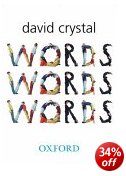how language arises, changes, is recorded, and used
David Crystal is a world-famous authority on language development, lexicography, linguistics, and anything else which concerns the words human beings use to speak and write. Words Words Words is the latest of his many books – an easy-to-read primer in which he attempts to convey his enthusiasm for all aspects of the subject. His intention is to explore the common fascination with all aspects of language and to answer some of the questions we ask about it. How many words are there in the English language for instance?
 He shows why it’s so difficult to answer this question accurately, but settles for ‘over a million’. He also tries to dispel myths. Does the Sun newspaper really use a lexicon of only 500 words? That’s a much easier problem. The answer is no. A sample he took showed the total was nearer to 7,000. He describes how dictionaries are compiled; the origins and history of words; how words are borrowed (stolen in fact) from other languages and rapidly adopted as our own – despite complaints from conservatives; how new words are created by blending (heliport) lengthening (chewing gum) shortening (demo) or simply changing the use of an existing word (gay).
He shows why it’s so difficult to answer this question accurately, but settles for ‘over a million’. He also tries to dispel myths. Does the Sun newspaper really use a lexicon of only 500 words? That’s a much easier problem. The answer is no. A sample he took showed the total was nearer to 7,000. He describes how dictionaries are compiled; the origins and history of words; how words are borrowed (stolen in fact) from other languages and rapidly adopted as our own – despite complaints from conservatives; how new words are created by blending (heliport) lengthening (chewing gum) shortening (demo) or simply changing the use of an existing word (gay).
He traces the history of English spelling and explains why it is so complex and irregular. His discussion of accents and pronunciation covers the way the language is spoken, and his argument is that things are changing all the time. It’s no use writing to the Times complaining that the BBC now pronounces controversy with the stress in the middle of the word, because that’s the way it is going.
He’s very good at conveying his enthusiasm for language. He writes warmly and tolerantly on slang, jargon, and even has a good word to say for cliché, and he is more tolerant of children swearing than I am:
In Caernarfon, in North Wales, you hear people calling each other cunt all the time, quite unconcernedly. It just means ‘mate’.
That might be true in Caernarfon, but it would get you a thick ear if you tried it on in Stockport. He finishes with a series of practical suggestions for those people who would like to take the subject further. He recommends dictionaries (buy two); shows you how to find the meaning of names; how to estimate the size of your vocabulary; lists dialect societies to join; and even encourages you to contribute to dictionary building.
All the points he makes are illustrated with examples from both language history and contemporary usage. He throws in lots of amusing anecdotes, and the pages are decorated with side panels showing how to take each topic further. This approach really brings his subject to life and makes the study of language sound very attractive – and certainly within the grasp of the average reader.
© Roy Johnson 2007
David Crystal, Words Words Words, Oxford: Oxford University Press, new edition 2007, pp.224, ISBN: 0199210772